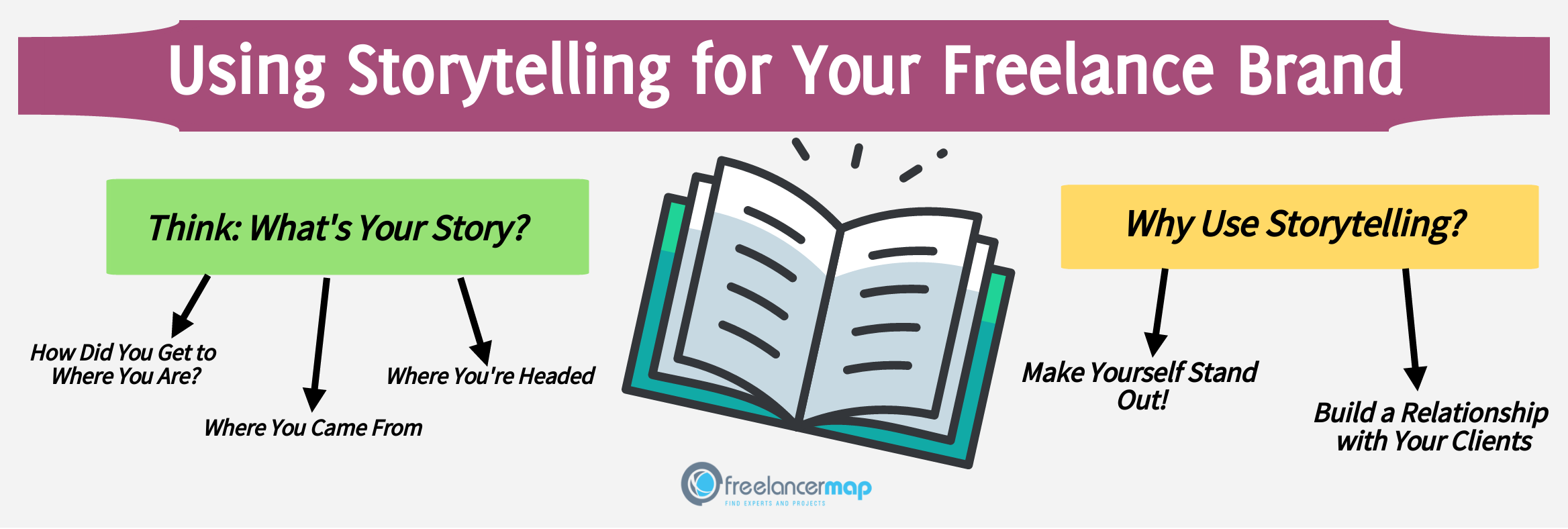Storytelling is an age-old art, possibly one of the very first arts there was. Stories invoke emotions and stick in our minds like no bare-bone facts can. It’s no wonder that storytelling has become very important in many areas, including brands and businesses. And guess what? As a freelancer, you’re a bit of both.


In the digital age, storytelling is not something that only authors can use, it has become so much more. In fact, the success of apps like Snapchat and, recently, Instagram, can largely be attributed to the emergence of storytelling in the digital sphere. Now anyone can tell their story and share it with the world.
What’s Your Story?
Everything can be a story – from your Twitter profile bio to each single application you send. These are stories about who you are, what skills you have and how that fits with the goal at hand. To give you an idea of what a story might be in that context, here are the three types that you will see most often in regards to freelancers and businesses:
Type 1: Where did you come from?
This is basically your origin story as a freelancer. It is all about describing motivations and illustrating where and why you started out as a freelancer in the first place.
Type 2: How did you get where you are?
This category can also be called the “success story” – those kinds of tales are used to inspire and motivate. If you’ve really nailed your brand and are looking to sell an eBook or maybe some online courses, this might the type of story for you.
Type 3: Where are you headed?
As the headline suggests, this is the type of story that looks into the future. It encourages people to stick with you or help you along the way because you have a compelling vision. Now these aren’t strictly separate types. They can be mixed and matched, they’re like puzzle pieces that fit together in lots of way to create something different every time. You can think of every application.


Why Should You Utilize Storytelling?
In case you’re not compelled by all the arguments made so far in this article towards utilizing storytelling, here’s two more that might be the most important of them all:
Make Yourself Stand Out
Freelancing is like being a single fish in the entire ocean – with the exception that you actually want to be noticed and pulled out on the surface. To do that, you want to be the brightest fish there is. In other words, you want to stand out. Whether we like it or not, people don’t stand out with a long list of skills and experiences. Even if you have those, you have to present them in the right way. People with engaging personal stories can be fascinating in a way no college degree can.
Freelancing is a Relationship Business
Secondly, freelancing is centered on building relationships – with your clients, with your audience, with fellow freelancers. You will need to be able to rely on these relationships at least as much as you can rely on your skills. They might decide whether you get that next project, whether or not you get a collaboration offer from a colleague – and they will definitely decide if you’re getting recommended by someone. Storytelling is the best way to give a starting boost to those relationships.


3 Ways to Tell Your Story the Right Way
We’ve talked about what a story is and why you should tell yours – here’s how you tell it.
1. Active vs Passive
Every story needs a storyteller who also determines whether it’s passive or active. A passive story is where things happen to you. Where your talent gets noticed, you get recommended, or a colleague helps you along the way. An active story attributes more of your success to yourself – where you made sure you got noticed, found the right people to work with and worked hard to get where you’re at.
2. Don’t be Afraid to Mention Weaknesses
Be careful of overselling yourself, though. Everybody makes mistakes. If you try to present your story in a way that makes you look like someone with a perfect record, no slip-ups and always making the right decisions, people will notice. In fact, admitting weaknesses will help people empathize and relate to your story – and that’s a sure way towards being remembered.
3.Modify the Focus
You don’t only have one single story you’re telling. You have several, probably even dozens. According to what a story is aimed at, you should modify it. Think of telling stories like applying for different projects. You focus first and foremost on the skills that are most important to the project. Similarly, always have a goal when telling a story and build it up from there.
How are you using storytelling in your freelancing business? Share and discuss in the comment section below this article!
